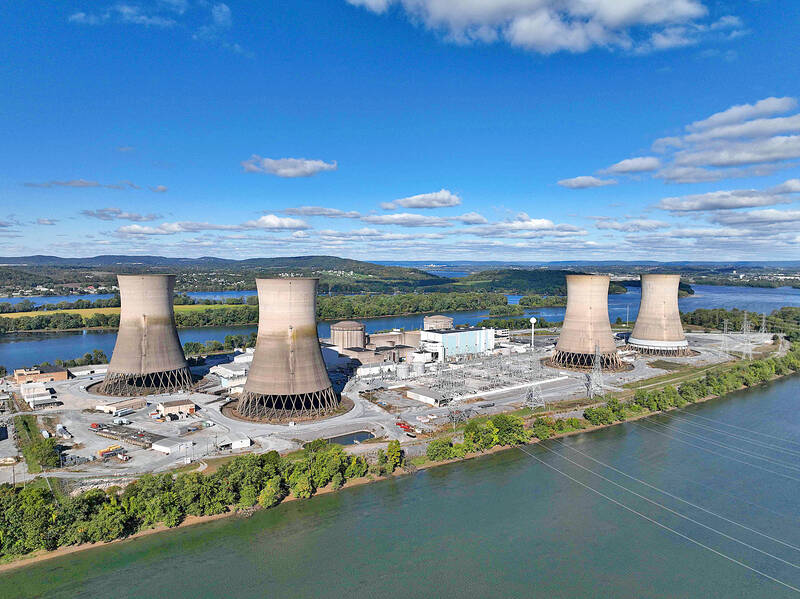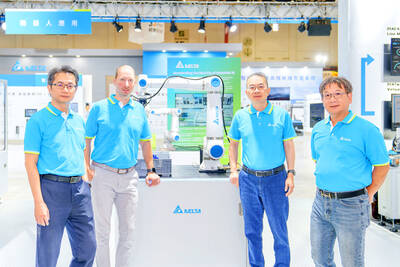NextEra Energy Inc, one of the world’s biggest suppliers of wind and solar power, is seeking to expand its natural gas and nuclear generation in a bid to meet the surging demand for electricity sparked by artificial intelligence (AI).
The company has partnered with gas turbine manufacturer GE Vernova Inc to build power generation for data centers and factories, chief executive officer John Ketchum said on an earnings call on Friday.
NextEra has also taken the first step to restarting its shuttered Duane Arnold nuclear plant in Iowa.

Photo: AFP
US power consumption is rising, driven by data centers and AI, along with manufacturing and the increasing electrification of the economy. That has spurred demand for new gas plants and reawakened interest in nuclear energy. The electricity boom has sparked new ideas and deals that would once have been unthinkable.
“The idea would be to go after and target large-load customers and do it in an integrated way where we can combine gas-fired generation with renewable and battery storage,” Ketchum said on an earnings call on Friday.
NextEra shares gained as much as 5.8 percent in New York.
“It can’t be underestimated how much this industry has changed in a very short amount of time, really the last 15 months to 18 months,” Rebecca Kujawa, head of subsidiary NextEra Energy Resources, said on the call. “We’ve seen a lot of increase in demand for natural gas.”
GE Vernova has said data centers favor gas over intermittent renewable sources like wind because the facilities demand power around the clock. GE Vernova chief executive officer Scott Strazik this week said that orders for gas turbines more than doubled to 20 gigawatts last year and he expects this year to be even stronger.
NextEra has asked US regulators for a licensing change for the Duane Arnold nuclear plant, a first step toward potentially restarting the Iowa facility.
NextEra aims to get the reactor up and running again as early as the end of 2028, it said on Friday in an earnings release. The request was filed with the US Nuclear Regulatory Commission on Thursday, a company representative said. NextEra had previously said it was interested in reviving the plant.
NextEra is not the only company pursuing efforts to revive reactors. South Carolina utility Santee Cooper on Wednesday said it is seeking bids to restart construction of two reactors at the VC Summer Nuclear Station near Jenkinsville in South Carolina.
In September last year, NextEra rival Constellation Energy Corp announced plans to restart a reactor at the Three Mile Island plant in Pennsylvania to supply Microsoft Corp.
The 600-megawatt Duane Arnold plant closed in 2020 after its biggest customer decided to exit its power-purchase agreement. The facility was also damaged in a windstorm that same year, prompting the company to close the plant two months earlier than planned.
NextEra has said Duane Arnold, which went into service in 1974, uses less-complex technology that might make it easier to revive than newer nuclear plants.
However, Jefferies & Co analyst Julian Dumoulin-Smith has said bringing the facility back into service would be costly and there is no guarantee the economics would be justified.

SETBACK: Apple’s India iPhone push has been disrupted after Foxconn recalled hundreds of Chinese engineers, amid Beijing’s attempts to curb tech transfers Apple Inc assembly partner Hon Hai Precision Industry Co (鴻海精密), also known internationally as Foxconn Technology Group (富士康科技集團), has recalled about 300 Chinese engineers from a factory in India, the latest setback for the iPhone maker’s push to rapidly expand in the country. The extraction of Chinese workers from the factory of Yuzhan Technology (India) Private Ltd, a Hon Hai component unit, in southern Tamil Nadu state, is the second such move in a few months. The company has started flying in Taiwanese engineers to replace staff leaving, people familiar with the matter said, asking not to be named, as the

The prices of gasoline and diesel at domestic fuel stations are to rise NT$0.1 and NT$0.4 per liter this week respectively, after international crude oil prices rose last week, CPC Corp, Taiwan (台灣中油) and Formosa Petrochemical Corp (台塑石化) announced yesterday. Effective today, gasoline prices at CPC and Formosa stations are to rise to NT$27.3, NT$28.8 and NT$30.8 per liter for 92, 95 and 98-octane unleaded gasoline respectively, the companies said in separate statements. The price of premium diesel is to rise to NT$26.2 per liter at CPC stations and NT$26 at Formosa pumps, they said. The announcements came after international crude oil prices

STABLE DEMAND: Delta supplies US clients in the aerospace, defense and machinery segments, and expects second-half sales to be similar to the first half Delta Electronics Inc (台達電) expects its US automation business to remain steady in the second half, with no signs of weakening client demand. With demand from US clients remaining solid, its performance in the second half is expected to be similar to that of the first half, Andy Liu (劉佳容), general manager of the company’s industrial automation business group, said on the sidelines of the Taiwan Automation Intelligence and Robot Show in Taipei on Wednesday. The company earlier reported that revenue from its automation business grew 7 percent year-on-year to NT$27.22 billion (US$889.98 million) in the first half, accounting for 11 percent

A German company is putting used electric vehicle batteries to new use by stacking them into fridge-size units that homes and businesses can use to store their excess solar and wind energy. This week, the company Voltfang — which means “catching volts” — opened its first industrial site in Aachen, Germany, near the Belgian and Dutch borders. With about 100 staff, Voltfang says it is the biggest facility of its kind in Europe in the budding sector of refurbishing lithium-ion batteries. Its CEO David Oudsandji hopes it would help Europe’s biggest economy ween itself off fossil fuels and increasingly rely on climate-friendly renewables. While